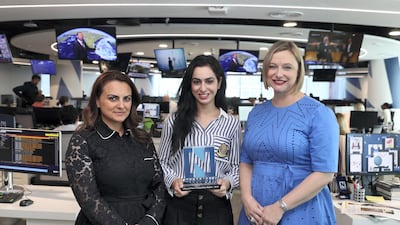Mahinaz Hamza was the winner of The National’s Future of News competition for aspiring young journalists. She is 20 years old and studies Communication and Media Sciences at Zayed University, Dubai campus. This article is her winning submission.
A wise man named Edward Lytton once famously said that “beneath the rule of men entirely great, the pen is mightier than the sword.” As old-fashioned as they may sound nowadays, one cannot deny the truth of his words. The ability to write was and has always been one of our most powerful weapons, helping us to express ourselves, share our ideas, bring change and curate our history.
One of the most influential forms of writing is journalism. For many years, journalists have served as the voice of the voiceless, the watchdog of governments and our main sources of information. However, times change.
Today, we are living in a digital era driven by speed and immediacy. Journalists are no longer our primary source of news. Fresher, more engaging alternatives, such as social media, have overtaken traditional print sources and their websites.
As we continue to advance, we constantly come up with even more exciting developments. One of the most important breakthroughs in technology today is artificial intelligence (AI). Much is made of AI’s potential and, yes, it does have the capacity to greatly improve healthcare, education, poverty and national security. It is also clearly able to perform certain tasks far more efficiently than humans ever will. The question we have to ask ourselves, however, is: at what cost?
Let us look at journalism, the many ways in which AI is currently impacting it and what advances in technology mean for the future of news.
Many people assume that AI is driving innovation in the newsroom – restructuring workflows, digging out insights, analysing and eliminating fake news and generating content. They will no doubt presume that such work is being performed much faster and that the fact checking is much more reliable than that of a flesh-and-blood person. However, the truth is that AI is doing more harm than good.
Technology is gradually reconstructing both our present and our future. As we take advantage of their many capabilities, we should remember that AI networks are nothing more than organisations of knowledge, built on the perspectives and perceptions of those who designed them – in many cases, a homogenous group of men based in Silicon Valley. We must also consider the potential hidden biases of their algorithms and the fact that new technologies will almost always open new avenues for manipulation.
Another big question we must all ask ourselves is what impact the introduction of AI systems will have on the UAE’s future? As a student currently enrolled in journalism courses, I cannot imagine a work environment staffed by machines. Nor do I want to envision a robot telling me what stories to write, or what it believes will make the most eye-catching headlines. It might sound silly to picture such a scene, but AI is a reality we cannot deny. No one wants to live in a world of right and wrong or a world of yes and no, where there is no room for human error, creativity and imagination.
There is no doubt that AI may have given journalists more time to focus on what they do best – reporting news. However, while the technology boom continues, scepticism and will always play a huge part in any discussion of its potential impact on our future.
Technology already plays a key role in data-driven types of reporting such as sports and finance. But while AI might process information efficiently and eventually even build a bank of data rich enough to allow it to master human languages, we must also bear in mind that one of the most important aspects of journalism is adherence to a specific code of ethics. Such moral systems are far too complex and far too human to translate into an algorithm.
Just imagine our news, our source of knowledge about the world around us, written and edited by computers. Surely this is not the environment we want future generations to grow up in. So, what should we do?
For journalists to survive in the coming years, they must understand the AI they are working with and learn new technical skills such as how to code. They must also limit the role of AI. For instance, it could be used for the gathering of information, but journalists should always edit pieces and be the ones to decide the angle of a story.
Francesco Marconi, strategy manager and AI co-head at the Associated Press has said that “one day content will be tailored at scale and adapted to individual personality, tone, location and time of day”. As media companies race to identify ways for AI to generate personalised content, journalists must also find ways to monitor, manage and use technology to their own advantage. If not, they could find themselves sleepwalking towards their own obsolescence.

